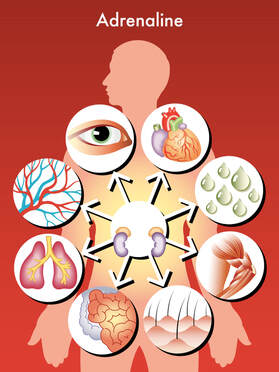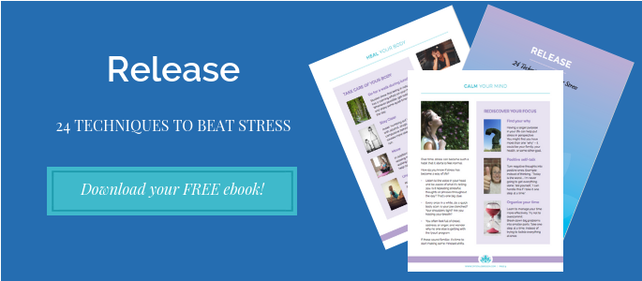|
We're headed into. a busy time of year with new schedules, etc... and I know that as women, we often try to toughen up and push through. Spoiler alert: you can't do it. That’s because stress isn’t all “in your mind.” It’s also in your body. Your stress response system is a primal reaction... it’s hardwired into your system to keep you safe and alive. Today, I'm going to outline some important things you need to know about stress and how it affects you – info that also will help you:
When your ancestors were under threat – whether it was fighting off a predator or dealing with everyday problems like feeding a growing family – their bodies responded with energy to keep them out of harm’s way. Our culture has changed a lot since then, but our body’s wiring hasn’t. We react to stress the same way, except our stressors don’t require us to outrun a bear or worry about where our next meal is coming from. And that can have a major impact on your health! I want to walk you through what happens to your body during a typical stressful situation. Hang in there with me, because it’s pretty eye-opening.  Let’s pretend you have an interview for a potentially life-changing job at 8 a.m. next Tuesday. You really want this job, so you spend a lot of time researching and preparing. But then Tuesday morning you wake up and look at your clock, and your eyes see that it’s 7:15 a.m. Your alarm didn’t go off! Here’s a quick outline of what happens in your body. Your eyes send that information to your brain’s amygdala, which helps you interpret what you see and hear. Your amygdala basically says, “What the #@*&!!!!?” It sends a distress call to your brain’s command center, your hypothalamus, which talks to the rest of your body through your autonomic nervous system.  As soon as it hears the distress call, your hypothalamus flips on the sympathetic nervous system, telling your adrenal glands to release epinephrine (aka adrenaline) into your bloodstream. This is basically your body’s “GO!” juice. Your heart beats faster, sending blood to your muscles and other organs. Your airways open wide as your breathing speeds up, allowing more oxygen into your system. Some of that extra oxygen goes to your brain, sharpening your senses and making you more alert. To power all that action, the epinephrine also prompts your body to release fuel, in the form of extra blood sugar and stored fat. All of that happens lightning-fast, before you even have a chance to fully register that your alarm didn’t go off! Your body does this to either give you the fuel you need to run away fast … or go to battle. Which is exactly what you do, by jumping out of bed and springing to action. You have a LOT to do in a short period of time, and so much is riding on this interview!  Your body kicks on its second stress-response layer, your HPA axis, which consists of your hypothalamus, your pituitary gland, and your adrenal glands. Your adrenal glands dump cortisol (and more fuel) into your system, to keep your accelerator on until the stress passes. When you finally hop into your car, you relax a little, triggering your parasympathetic system, which puts the brakes on your stress response so you can start to relax. But at the interview (which somehow, miraculously, you arrive at on-time!), your sympathetic response kicks back on, keeping you sharp so you can nail the interview. On the drive back home, your cortisol levels dip back down, once again triggering your parasympathetic “recovery” system. As your blood sugar levels dip because your body releases insulin to gobble it up from your system, you feel yourself becoming hungry and tired, or maybe even “hangry” until you can get something to eat. If this is an isolated issue, you’ll go on your way, having a normal day. Over time, this constant revving of your sympathetic nervous system can lead to health problems that can damage your blood vessels, cause high blood pressure and increase your risk of stroke or heart attack! As you can see, learning how to trigger your body’s parasympathetic (aka “rest & digest”) system is an important part of learning how to de-stress. I have a brand new eBook called “Release” that outlines 22 tips and techniques – including powerful breathing exercises – to help your body learn how to shed stress and find calm.What do you do to calm down or destress? Please share in the comments below.
1 Comment
10/25/2019 03:12:09 am
I know exactly what happens. Your immune system will be very weak. It's going to be very easy for you to catch colds or flu. If you have any dread disease, it's going to beat you mercilessly. The best way to heal and protect yourself from any kind of disease is to avoid any possible cause of stress. Try to stay away from people that wear you out emotionally. It's not healthy to be in some kind of roller coaster all the time. You are not getting any younger. Don't push yourself to the borders. Just simply avoid it.
Reply
Leave a Reply. |
Click below to join my FREE Facebook Group-
Women's Wellness Circle: Create Your Extraordinary Life AuthorHi, I’m Crystal! If you'd like to access my Farmer's Market Friday posts from 2018, click here!
Categories
All
|




 RSS Feed
RSS Feed